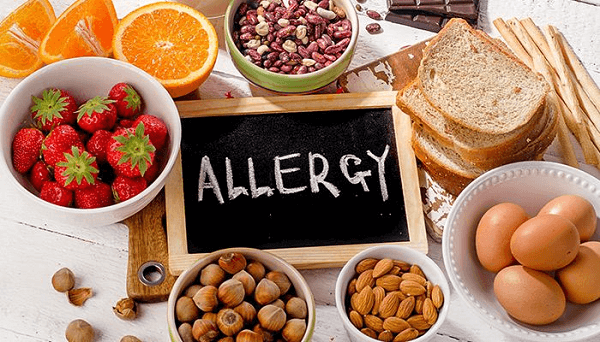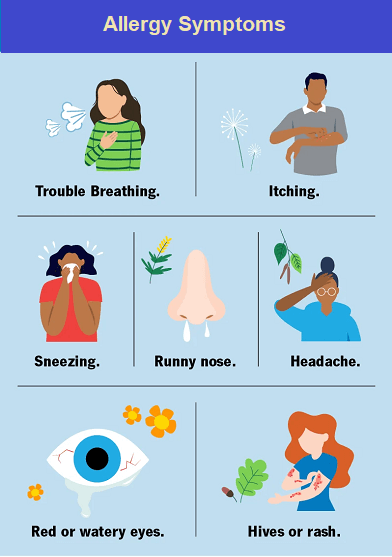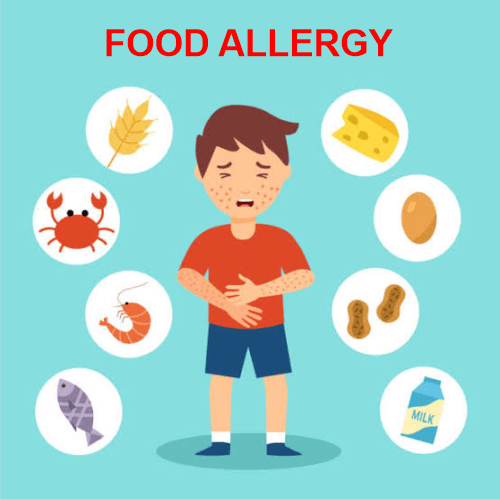Allergy Definition
It is a hypersensitivity disorder of the immune system, where the body responds to a substance that is usually nonlethal to the body. These substances are called Allergens and can be observed in pollen, animal dander, food, insect bites, dust mites, medication, and other environmental factors. When an allergic person comes into the association of allergens, their immune system generates an abnormal reaction generating symptoms from mild to severe itching, anaphylaxis, runny nose, hives, sneezing, and asthma. Allergies usually impact crores of people globally.

Types of Allergies
- Exercise-Caused Allergy: Unusual response triggered by physical activity when it happens after consuming some food items or in winter weather.
- Oral Allergy Syndrome: Responses to some nuts, raw fruits, and vegetables that react with pollen allergens.
- Environmental Allergies: A response to airborne allergens such as animal dander, pollen, dust mites, and mold spores
- Latex Allergies: It is a response to some items constructed from natural rubber latex, such as medical devices, balloons, and gloves
- Food Allergies: A reaction to food items such as shellfish, soy, tree nuts, peanuts, milk, eggs, and fish.
- Insect Sting Allergies: It reacts to the venom of hornets, fire ants, wasps, and bees.
- Medication Allergies: It is a response to prescription or over-the-counter drugs, including aspirin, antibiotics, and non-steroidal anti-inflammatory drugs.
- Anaphylaxis: It is a potential life danger and severe allergic response that can impact multiple body organs and systems in the body.
- Occupational Allergies: It is a response to allergens located in the workplace like animal products, dust, or chemicals.
- Skin Allergies: It responds to skin contact with some materials that, include cosmetics, plants, soaps, and metals.
Symptoms of Allergy
Symptoms of Allergy differ from person to person, and some of the common symptoms include are:

- Coughing
- Shortening of Breath or wheezing
- Headache or sinus pressure
- Sneezing
- Skin rash or hives
- Feeling weak or Fatigued
- Runny or Stuffy Nose
- Vomiting, nausea, or Abdominal pain
- Watery eyes or Itchy
- Swelling of face, lips, or tongue
Reasons Behind the Development of Allergies
An allergy happens when the body's immune system overreacts to a usually harmless material, such as animal dander, dust, certain food, and pollen. When an allergic person comes into the association with an allergen, the immune system generates an antibody called immunoglobulin E (IgE), which activates the release of histamine and other chemicals into the body. These chemical substances generate allergy symptoms such as inflammation, swelling, and itching.
The actual reason why some people develop allergies, and some do not develop them is not known, but it is believed that environmental and genetic factors play a crucial role. A person who has a family history of allergies is more likely to have allergies. Other risk factors contributing to the development of allergies are Toxic chemicals, exposure to pollution, and smoking.
In some situations, it can become harmful and life-threatening. This type of situation is termed anaphylaxis. It is a condition where emergency medical treatment is required with epinephrine. Anaphylaxis can happen in response to some insect stings, medication, or food, generating symptoms like rapid heartbeat, loss of consciousness, and difficulty breathing.
Body Parts that may be Affected Due to Allergy
Here is a table that outlines the body parts that can be affected due to Allergy
| Body Parts |
Symptoms/ Conditions |
| Eyes |
Redness, Allergic Conjunctivitis, swelling of the eyes, itching, and watering |
| Cardiovsacular System |
Anaphylaxis (shock, rapid heartbeat, and low blood pressure) |
| Respiratory Organs |
Chest tightness, runny or stuffy nose, postnasal drip, wheezing, coughing, sneezing, itching or tingling sensation in the nose, shortness of breath |
| Digestive System |
Food allergies, Vomiting, diarrhea, stomach cramps, abdominal pain, nausea, and bloating |
What to do When You Face Allergic Reactions?
If you are experiencing an allergic reaction, there are some methods that you need to follow to alleviate the symptoms and ask for medical help if you believe it is necessary. These are some steps that you should observe:
- Recognize the Allergen: The victim should try to discover what triggers allergy symptoms. This could involve some food items, pollen, dust, etc.
- Cover Yourself (Limit the Exposure): Limit yourself from exposing your body to allergens like pollen, dust, food items, etc. This can be done by staying indoors and keeping the windows and doors shut, and Air conditioning can be used for the purpose.
- Seek Medication Help: Allergic symptoms like runny nose and sneezing can be healed through Antihistamines. Decongestants can heal nasal Congestion. If the symptoms are strong, seek medical help.
- Apply Saline Nasal Rinse: It will clear your nasal passage and lower the Congestion.
- Ensure your House Should be Clean: Proper sanitation and cleanliness of your surroundings ensure that allergens are present in low quantity. Some of the advisable equipment that can be used for better cleaning are washing curtains and bedding at regular intervals, and using a vacuum cleaner is also suggested.
- Seek Professional Help (Doctor): If you believe that Allergic symptoms are strong and medication is not yielding any result, then it is advised you should seek the help of a doctor. A doctor would conduct an allergy test to identify the cause and recommend a proper treatment based on the cause.
Preventive Measures
Allergies are a usual but frustrating condition that generates a wide spectrum of symptoms from severe to lukewarm. Hopefully, some preventive measures need to be observed to avoid the side effects of the Allergy:
- Keep a Healthy Diet: A healthy diet routine can strengthen your immune system and aid you in lowering the severity of the symptoms. Consuming different types of fruits, whole grains, and vegetables and ignoring processed sugary items can strengthen your immune system and lower inflammation.
- Avoid Allergens: Avoiding exposure to allergens is one of the effective ways to prevent allergies. It involves ignoring some food items, using the filter or air purifier, staying indoors during high pollen seasons, and not coming into contact with animals that would activate the allergies.
- Medication: Nasal corticosteroids, Antihistamines, and Decongestants are suggested medications that can lower allergy symptoms. Consult your doctor for medicines that will suit your body.
- Immunotherapy: It is a long-term treatment that requires exposing the immune system to a minute quantity of allergens over a period to construct immunity. This highly effective process lowers or neutralizes allergy symptoms in some people.
- Stress Management: High-stress level weakens the immune system and enhances the severity of the allergy symptoms. Observing stress-releasing techniques is the best way to manage stress and strengthen your immune system. Some stress management techniques involve deep breathing exercises, yoga, or sleep.
- Ensure the Home is Clean: Irritants, Mold, and dust can activate allergies, so it is significant to ensure the home to sanitized and free of allergens.
It can be said that by following, proper stress management techniques, ensuring the home is clean, avoiding allergens, maintaining a healthy diet, immunotherapy, and consumption of suitable medicine will help you in avoiding allergies.
Common Medications Used in the Treatment of Allergy

Allergy medications are present in the form of pills, skin creams, nasal sprays, inhalers, and shots. Some can be availed through prescription and over-the-counter. The summary has been given below and along with usage.
- Antihistamines: It restricts histamine. It is a symptom causing chemicals the immune system liberates during an allergic reaction.
- Liquids and Pills: Oral Antihistamines can be availed through prescription and over the counter. They help overcome problems like watery eyes, swelling, runny nose, etc. These drugs may generate tiredness and drowsiness in your body. So it is advised that people consume these medicine with some caution.
- Those antihistamines that would trigger drowsiness are Chlorpheniramine and Diphenhydramine. Some antihistamines would trigger less drowsiness, including Loratadine, Cetirizine, Levocetirizine, Desloratadine, and Fexofenadine.
- Nasal Sprays: Some of the symptoms, like postnasal drips, runny nose, itchy sneezing, and sinus congestion, can be relieved by Antihistamine nasal sprays, but these nasal sprays also have some side effects, including tiredness, drowsiness, and a bitter taste.
- Eyedrops: Antihistamine eyedrops can be availed through prescription and over-the-counter. It will help you in easing red, swollen eyes and itching. These drops might will contain an amalgamation of other medicine and antihistamines.
Some of the negative effects of the medicine include dry eyes and headaches. Some examples of eyedrops include: Ketotifen, Olopatadine Pheniramine, and naphazoline
- Decongestants: It is applied for the instant and short-term relief of sinus and nasal Congestion. They can initiate increased blood pressure, sleeping troubles, irritability, and headache. This medicine is not suggested for those with high blood pressure, hyperthyroidism, cardiovascular disease, or glaucoma.
- Nasal Sprays and Drops: Nasal Decongestant sprays and drops ease sinus and nasal Congestion. Examples of Nasal Sprays and Drops include Oxymetazoline and Tetrahydrozoline.
- Mast Cell Stabilizers: Mast cell stabilizers stop the liberation of immune system chemicals that participatein allergic reactions. These drugs are harmless but must be used for many days to generate the full effect. These are prescribed when the antihistamines become non-operational and intolerable.
|



 For Videos Join Our Youtube Channel: Join Now
For Videos Join Our Youtube Channel: Join Now










